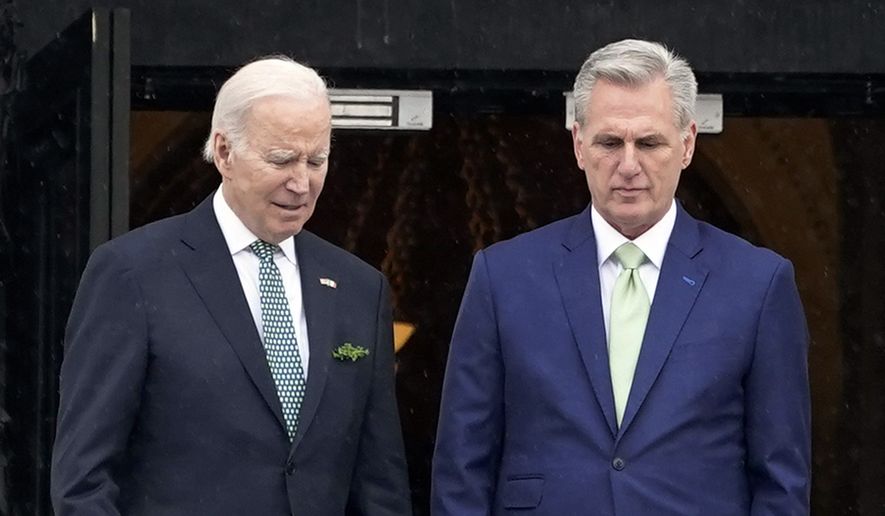House Speaker Kevin McCarthy’s plan to raise the debt limit by $1.5 trillion in exchange for slashing spending by $4.5 trillion is estimated to kill 780,000 jobs by the end of 2024, according to a top financial services firm.
Moody’s Analytics compared the impact that Mr. McCarthy’s proposal would have on the federal economy with the alternative of a clean debt limit increase that is favored by President Biden. The firm found that if Republicans secured all of their desired cuts, the nation would skirt closer to a recession.
“Under the legislation, GDP growth is so weak that employment declines in the first three quarters of 2024,” Moody’s chief Mark Zandi and fellow economist Bernard Yaros wrote in a report. “Compared with the clean debt limit scenario, by year-end 2024, employment is 780,000 jobs lower.”
The analysis comes as Mr. McCarthy, California Republican, readies to push the debt legislation through the House this week. The bill cuts federal spending by $130 billion for the upcoming fiscal year and limits future budget growth to 1% annually over the next decade.
GOP lawmakers also propose to rescind at least $90.5 billion unspent COVID-19 relief and $200 billion in green energy tax credits passed by Democrats last year. They also want to cancel Mr. Biden’s student loan forgiveness program, a cancellation that the Committee for a Responsible Federal Budget estimates would save taxpayers $500 billion over the next decade.
“President Biden’s reckless spending created record inflation, made us more dependent on China, and undermined Social Security and Medicare,” said Mr. McCarthy.
The GOP legislation would impose new requirements that individuals work at least 20 hours per week to qualify for Medicaid and food stamps. It also increases the age limit for work requirements from 49 to 55.
Mr. Biden is threatening to veto the bill if it passes the House and Democratic-controlled Senate.
“The bill stands in stark contrast to the President’s vision for the economy,” the White House said in a statement. “Therefore, if the president were presented with the [legislation] … he would veto it.”
Mr. Biden’s veto threat could be jumping the gun, however. Mr. McCarthy is struggling to unify House Republicans behind the legislation.
More than a dozen GOP lawmakers are on the fence about the bill.
Some hard-line Republicans in the House Freedom Caucus are opposed to raising the debt limit at all, saying the focus should be explicitly on cutting spending.
“I don’t want to vote for a debt ceiling increase,” said Rep. Bob Good, Virginia Republican. “I don’t think we ought to be spending at a level where we need to increase the debt ceiling.”
Others want to increase work requirements on entitlement programs to 30 hours a week. That presents a potential problem for moderate Republicans running in districts that Mr. Biden won in 2020.
Republicans from the Midwest also have concerns about repealing Mr. Biden’s green energy tax credits as they benefit farmers in the biofuel industry.
Mr. McCarthy can lose only four votes on any legislation before having to rely on Democratic votes for passage. At the moment, Democrats are ruling out backing anything other than a clean-debt ceiling resolution.
“They’ll either produce the votes and pass a bill out of the House next week, or they won’t,” said House Minority Leader Hakeem Jeffries, New York Democrat. “I’m pretty confident that not a single member of the House Democratic Caucus is going to support their extreme proposal.”
• Haris Alic can be reached at halic@washingtontimes.com.




Please read our comment policy before commenting.